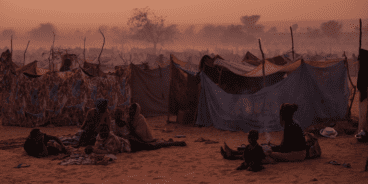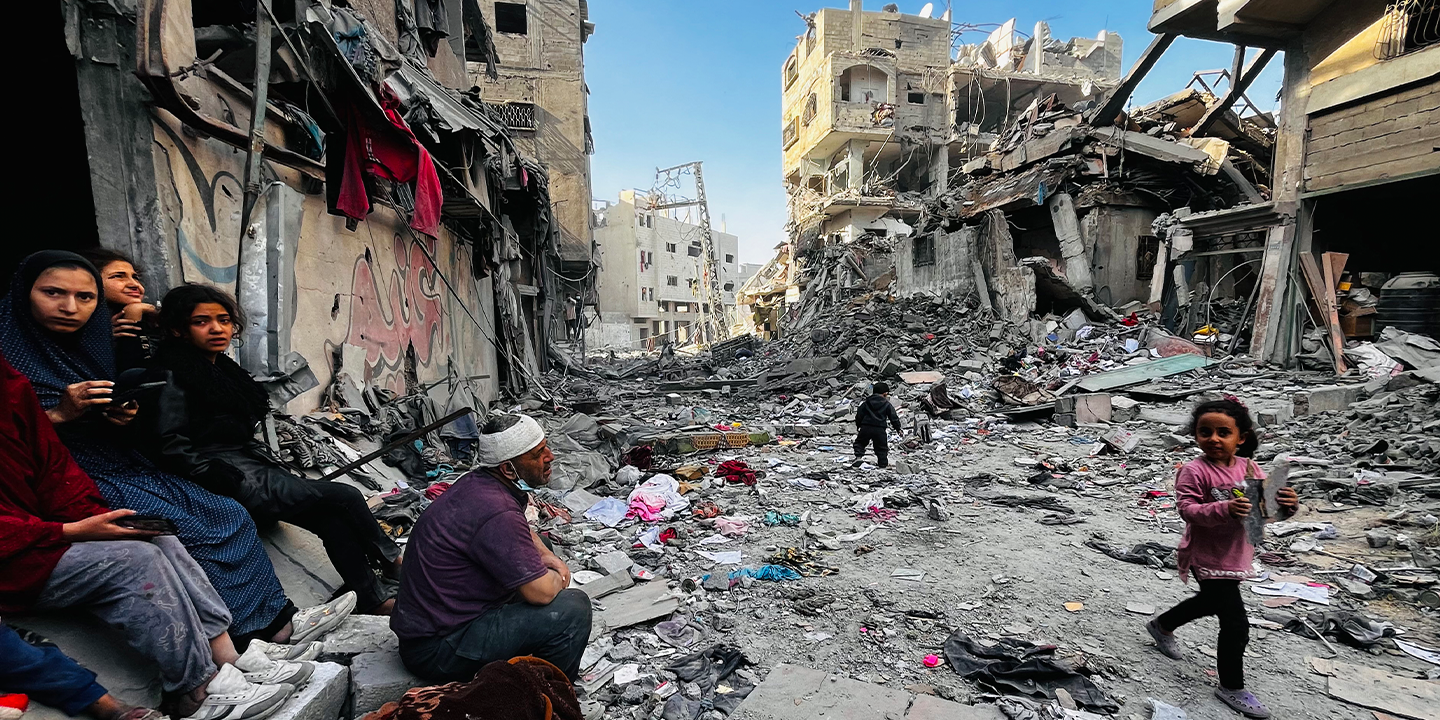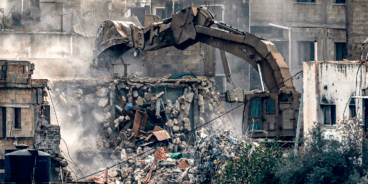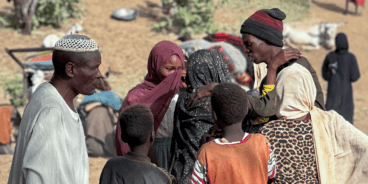

Atrocity Alert No. 415: Israel and the Occupied Palestinian Territory, Sudan and North Korea
Atrocity Alert is a weekly publication by the Global Centre for the Responsibility to Protect highlighting situations where populations are at risk of, or are enduring, mass atrocity crimes.
FURTHER DEVASTATION AND DEPRIVATION IN NORTHERN GAZA AS ISRAEL’S ATTACKS ESCALATE
On 29 October an Israeli strike on a residential building sheltering displaced people in northern Gaza’s Beit Lahiya town left 93 Palestinians killed or missing, including at least 25 children, marking one of the deadliest single attacks in Gaza in nearly three months. The Director of the Kamal Adwan Hospital – one of the few remaining medical facilities partially functioning in northern Gaza – warned that many of those injured may die because of a lack of resources. Following shelling of the hospital compound, Israeli forces conducted a days-long raid, detaining dozens of patients, medical staff and some displaced people, leaving only two doctors at Kamal Adwan Hospital, according to the UN Office for the Coordination of Humanitarian Affairs. The UN Relief and Works Agency for Palestine Refugees in the Near East (UNRWA) said it has received “desperate pleas” from northern Gaza, with people trapped under rubble and first responders blocked from reaching them.
Since early October Israel has intensified its siege and assault on northern Gaza – particularly around Jabalya, Beit Lahiya and Beit Hanoun – resulting in widespread devastation and deprivation, as thousands of civilians remain cut off from aid and protection. Israel also renewed mass evacuation orders for the estimated 400,000 Palestinians remaining in the north, with no safe place to go. UN High Commissioner for Human Rights Volker Türk stated that these “policies and practices in northern Gaza risk emptying the area of all Palestinians. We are facing what could amount to atrocity crimes, including potentially extending to crimes against humanity.” The High Commissioner’s Office has warned that the Israeli military is effectively subjecting an entire population to relentless bombardment and risk of starvation, as well as being forced to choose between mass displacement and being trapped in an active conflict zone. These actions also likely amount to the war crimes of forced displacement, collective punishment and the use of starvation as a weapon of war.
On 28 October the Israeli Parliament passed two laws that threaten to put a halt to UNRWA, the UN’s most important aid agency for Palestinian refugees in Occupied Palestinian Territory (OPT) and elsewhere. The laws, which will go into effect in 90 days, would prevent UNRWA from operating in territories under Israeli control and revoke the Agency’s privileges and immunities. Philippe Lazzarini, Head of UNRWA, stressed that the legislation violates Israel’s obligations under international law, sets a dangerous precedent and “will only deepen the suffering of Palestinians” if implemented. Nearly the entire population of Gaza depends on humanitarian assistance, with UNRWA as the “backbone” of the UN’s relief efforts. In response to the legislation, Norway said it will put forward a UN General Assembly resolution requesting an advisory opinion from the International Court of Justice (ICJ) on Israel’s obligations to facilitate aid to Palestinians. By blocking UNRWA’s operations, Israel is disregarding the ICJ provisional measure orders to ensure the delivery of life-saving aid into Gaza.
Under international law, Israel as the occupying power has an obligation to ensure the safety and protection of Palestinians as the occupied population, as well as guarantee that adequate aid reaches them wherever they are. Israel must immediately implement all provisional measures orders. An immediate ceasefire must be urgently reached, and UN Security Council Resolution 2735 must be implemented without delay. Member states should unequivocally and publicly support and fully fund UNRWA. Governments with influence must use all diplomatic means to urge the Israeli government to repeal the legislation dismantling UNRWA’s work in the OPT.
DRAMATIC ESCALATION OF VIOLENCE IN AL JAZEERA STATE, SUDAN
Between 20 and 25 October the Rapid Support Forces (RSF) reportedly launched a series of violent attacks across Sudan’s Al Jazeera State, indiscriminately killing scores of civilians, committing acts of sexual violence against women and girls, and looting markets, homes and farms. Al-Sireha village, northern Al Jazeera, appears to have been the hardest hit, with the Wad Madani Resistance Committee reporting at least 124 civilian deaths and 100 injured. The UN Office for the Coordination of Humanitarian Affairs indicated that residents in over 30 villages and towns experienced physical assaults, humiliation and threats, forcing thousands to flee their homes in search of safety. An estimated 46,700 people fled to Gedaref, Kassala and River Nile States in one week alone.
On Saturday, 26 October, Clementine Nkweta-Salam, UN Resident and Humanitarian Coordinator in Sudan, stated, “I am shocked and deeply appalled that human rights violations of the kind witnessed in Darfur last year – such as rape, targeted attacks, sexual violence, and mass killings – are being repeated in Aj Jazirah State [Al Jazeera State]. These are atrocious crimes.” Reports suggest that the RSF’s attacks were a retaliatory response to the recent defection of Abuagla Keikal, a high-ranking RSF officer from the region, to the Sudanese Armed Forces.
In a briefing to the UN Security Council (UNSC) on 28 October, UN Secretary-General António Guterres expressed grave concern for the people of Sudan, describing the situation as a “nightmare of mass ethnic violence.” He presented a report that included recommendations for the Protection of Civilians (PoC) in Sudan, in accordance with Resolution 2736. The report underscores the alarming escalation of inter-communal and ethnically motivated violence – fueled by an increase in hate speech and campaigns to incite violence – and details the destruction of critical civilian infrastructure and indiscriminate attacks in residential areas and internally displaced persons camps. The report also refers to the multiple warnings issued by the UN Special Adviser on the Prevention of Genocide regarding the growing risk of genocide and other atrocity crimes in Sudan.
The UNSC must urgently consider the options for PoC outlined in the Secretary-General’s report. Without immediate and proactive measures, civilians will continue to bear the brunt of the conflict, and the potential for large-scale atrocity crimes increases. While establishing a ceasefire agreement remains critical for long-term peace, it should not be viewed as a prerequisite for protecting vulnerable populations. The international community must intensify efforts to ensure rapid, safe, unhindered and sustainable humanitarian access. It should also explore various operational modalities for potentially deploying a protection force and leverage diplomatic avenues to pressure the warring parties into respecting and adhering to international law.
NORTH KOREA DEPLOYS 10,000 TROOPS TO SUPPORT RUSSIA’S WAR EFFORTS IN UKRAINE
The Democratic People’s Republic of Korea (DPRK) has reportedly sent over 10,000 troops, including officers and generals, to bolster Russia’s full-scale invasion of Ukraine. This unprecedented deployment of North Korean forces to Russian territory is corroborated by satellite images recently released by South Korea, as well as widely circulated videos on social media, and marks a significant step in military cooperation between the two countries.
The mobilization of North Korean troops escalates the risk of further war crimes in Ukraine. The DPRK government’s policy of forced military conscription, which in some instances may amount to slavery under international law, means that many North Korean soldiers may be unwittingly abetting and/or perpetrating potential war crimes and crimes against humanity in Ukraine.
The deployment of troops follows the signing of a mutual defense pact in June, which commits Russia and North Korea to defend each other against invasions. The agreement may also open avenues for Russia to support the DPRK’s unlawful nuclear and missile development programs, circumventing UN sanctions and undermining the global non-proliferation framework. Prior to the signing of the mutual defense pact, the recently-terminated UN Panel of Experts had provided credible evidence of arms-related transfers between the DPRK and Russia over the past year, in direct violation of multiple Security Council resolutions.
Julia Saltzman, DPRK expert at the Global Centre for the Responsibility to Protect, expressed grave concern, stating, “The DPRK’s role in Russia’s aggression against Ukraine would not be possible without its robust forced labor system and other human rights violations, many of which amount to crimes against humanity. By prioritizing its illicit nuclear and missile programs over the welfare of its people, the DPRK government has heightened risks to international peace and security — concerns repeatedly raised across the UN system. Despite these warnings, efforts thus far to prevent violations or curtail North Korea’s military advancements have had limited impact.”
The growing partnership between Russia and North Korea has serious implications for security in Europe, the Korean Peninsula and the Indo-Pacific region. It reflects a stark disregard for international norms and a heightened capacity to commit atrocities with impunity. The international community must maintain pressure on Russia to adhere to the International Court of Justice’s provisional measures and ensure that North Korea’s participation in the conflict does not lead to further atrocities or destabilization. A holistic response is needed, one that addresses both threats to global peace and ongoing human rights crises, ensuring that approaches to prevention and response do not remain siloed.
Related Content


World Leaders Must Act to End Israel’s Unlawful Presence in the Occupied Palestinian Territory
